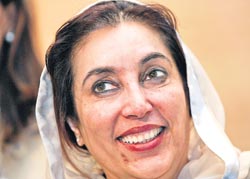
Bhutto gambles on Musharraf"I am trying to convince (party colleagues) that the international community and the armed forces have confidence in Musharraf, and therefore we need to work out a solution with him” – Benazir Bhutto ISLAMABAD, Pakistan - Exiled former leader Benazir Bhutto is gambling her future on a power-sharing deal with President Gen. Pervez Musharraf, hoping to revive a political dynasty. Bhutto is urging Musharraf to step down as military chief and drop corruption charges so she can come home and compete in parliamentary elections due by January. In return, the U.S.-allied Musharraf gets to stay on for another five years as a powerful civilian president.
But joining hands with the unpopular general could cost the liberal opposition leader support and turn her audacious bid to win a third term as prime minister into a political suicide. "For the first time in the history of Pakistan, from one end to the other end of Pakistan, there's complete unanimity: No more dictatorship," said Ghulam Mustafa Khar, a senior politician who has broken with Bhutto's Pakistan People's Party over her talks with Musharraf. "Now, Benazir stands up and says, 'Stay, Musharraf, stay!' ... That is something which is a nightmare for the people of Pakistan," he said. Bhutto rejects that criticism. She and Musharraf also argue that joining forces will strengthen Pakistan's efforts to combat extremism and prevent the kind of political chaos that could prompt another burst of martial law."I am trying to convince (party colleagues) that the international community and the armed forces have confidence in Musharraf, and therefore we need to work out a solution" with him, she told The Washington Post recently. But friends and foes warn that eight years of living abroad has left Bhutto out of touch with public sentiment. Khar accused her of betraying her party's values by reaching out to a man who toppled Pakistan's last civilian government and has lost public support at home and abroad for recently trying to fire the country's top judge. Khar was a close colleague of her father, party founder Zulfiqar Ali Bhutto, who was hanged on murder charges in 1979 after his ouster in an earlier military coup. By entering talks with Musharraf, Bhutto has offended the party's "long history of struggle against dictatorship," Khar said. "This is one thing that I have not even visualized or dreamt," he said. Benazir Bhutto was prime minister between 1988-1990 and 1993-1996. She was dismissed both times over allegations of corruption and mismanagement. In exile since 1999, she has led the Pakistan People's Party from London and Dubai. Wary that Musharraf could revive the corruption cases she fled, Bhutto also wants him to drop charges against her and scores of other politicians, including Nawaz Sharif, another former premier and fierce rival plotting a comeback. Sharif said Thursday he will return to Pakistan on Sept. 10 after seven years away. If Bhutto fights only for her own immunity from prosecution, she will lose further credibility, said political columnist Ayaz Amir. But if she gets Musharraf out of his army post, she can claim to have broken a political deadlock. "Then the People's Party will go to town and say, 'Look here, no one else could do this, and we've done it ... We won this great victory for democracy,'" said Amir, a former lawmaker in Sharif's party now writing for the Dawn newspaper.Musharraf has seen his authority crumble since March, when he tried unsuccessfully to oust Supreme Court top judge Iftikhar Mohammed Chaudhry. The move triggered protests that grew into a broad campaign against his continued rule. The court reinstated Chaudhry in July, raising expectations that it will uphold legal challenges to Musharraf's re-election. Sharif, poised to profit from any hiccups, says Bhutto has committed a "gross violation" of an agreement with him and other opposition parties not to talk with Musharraf. Amir said a Musharraf-Bhutto axis would protect U.S. interests by maintaining Pakistan's efforts against al-Qaeda and the Taliban. But the embrace of an army discredited by eight years of military rule could see her lose the upcoming election, said Talat Masood, a former Pakistani army general turned political analyst. "As a pillar of anti-establishment, she has become the supporter of establishment. It's a big departure in ideological terms," he said. "The die-hard support that she had received from a certain class of people all along will be seriously impaired." Masood counted himself among Bhutto's well-wishers but worried that "she has lost touch with the people in these last few years that she has been away." "It's the support of the people that's important. If you get that, you are in a much more advantageous position than even having the support of the uniform," he said. - Associated Press |
|| Front
Page | News | Editorial | Columns | Sports | Plus | Financial
Times | International | Mirror | TV
Times | Funday
Times || |
| |
Copyright
2007 Wijeya
Newspapers Ltd.Colombo. Sri Lanka. |
